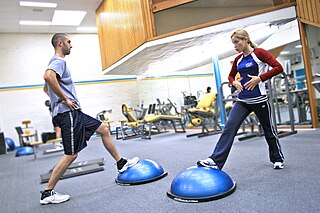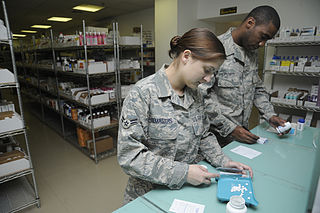Professional certification, trade certification, or professional designation, often called simply certification or qualification, is a designation earned by a person to assure qualification to perform a job or task. Not all certifications that use post-nominal letters are an acknowledgement of educational achievement, or an agency appointed to safeguard the public interest.

Vocational education is education that prepares people to a skilled craft as an artisan, trade as a tradesperson, or work as a technician. Vocational education can also be seen as that type of education given to an individual to prepare that individual to be gainfully employed or self employed with requisite skill. Vocational education is known by a variety of names, depending on the country concerned, including career and technical education, or acronyms such as TVET and TAFE.

A personal trainer is an individual who creates and delivers safe and effective exercise programs for healthy individuals and groups, or those with medical clearance to exercise. They motivate clients by collaborating to set goals, providing meaningful feedback, and by being a reliable source for accountability. Trainers also conduct a variety of assessments beginning with a preparticipation health-screening and may also include assessments of posture and movement, flexibility, balance, core function, cardio-respiratory fitness, muscular fitness, body composition, and skill-related parameters to observe and gather relevant information needed to develop an effective exercise program and support client goal attainment.
Professional development, also known as professional education, is learning that leads to or emphasizes education in a specific professional career field or builds practical job applicable skills emphasizing praxis in addition to the transferable skills and theoretical academic knowledge found in traditional liberal arts and pure sciences education. It is used to earn or maintain professional credentials such as professional certifications or academic degrees through formal coursework at institutions known as professional schools, or attending conferences and informal learning opportunities to strengthen or gain new skills.

Apprenticeship is a system for training a new generation of practitioners of a trade or profession with on-the-job training and often some accompanying study. Apprenticeships can also enable practitioners to gain a license to practice in a regulated occupation. Most of their training is done while working for an employer who helps the apprentices learn their trade or profession, in exchange for their continued labor for an agreed period after they have achieved measurable competencies.
A dietitian, medical dietitian, or dietician is an expert in identifying and treating disease-related malnutrition and in conducting medical nutrition therapy, for example designing an enteral tube feeding regimen or mitigating the effects of cancer cachexia. Many dietitians work in hospitals and usually see specific patients where a nutritional assessment and intervention has been requested by a doctor or nurse, for example if a patient has lost their ability to swallow or requires artificial nutrition due to intestinal failure. Dietitians are regulated healthcare professionals licensed to assess, diagnose, and treat such problems. In the United Kingdom, dietitian is a 'protected title', meaning identifying yourself as a dietitian without appropriate education and registration is prohibited by law.

The Canadian Securities Institute is a Canadian organization that offers licensing courses, advanced certifications, continuing education and custom training for financial services professionals in Canada and internationally.

A pharmacy technician performs pharmacy-related functions. Training, certification, licensing, and actual practice of pharmacy technicians varies not only worldwide but in some countries regionally as well as by employer.
According to the US Department of Education, the Educational Commission for Foreign Medical Graduates is "the authorized credential evaluation and guidance agency for non-U.S. physicians and graduates of non-U.S. medical schools who seek to practice in the United States or apply for a U.S. medical residency program. It provides comprehensive information and resources on licensure, the U.S. Medical Licensure Examination (USMLE), residencies, and recognition."

The International Association of Privacy Professionals (IAPP) is a nonprofit, non-advocacy membership association founded in 2000. It provides a forum for privacy professionals to share best practices, track trends, advance privacy management issues, standardize the designations for privacy professionals, provide education and guidance on career opportunities in the field of information privacy. The IAPP offers a full suite of educational and professional development services, including privacy training, certification programs, publications and annual conferences. It is headquartered in Portsmouth, New Hampshire.
Recognition of prior learning (RPL), prior learning assessment (PLA), or prior learning assessment and recognition (PLAR), describes a process used by regulatory bodies, adult learning centres, career development practitioners, military organizations, human resources professionals, employers, training institutions, colleges and universities around the world to evaluate skills and knowledge acquired outside the classroom for the purpose of recognizing competence against a given set of standards, competencies, or learning outcomes. RPL is practiced in many countries for a variety of purposes, for example an individual's standing in a profession, trades qualifications, academic achievement, recruitment, performance management, career and succession planning.
Certified Information Technology Professional (CITP) is a professional certification for professionals in the field of Information Technology. The CITP credential recognizes technical expertise across a wide range of business-technology practice areas.

Rehabilitation counseling is focused on helping people who have disabilities achieve their personal, career, and independent living goals through a counseling process.
The National Institute for Certification in Engineering Technologies (NICET) is an organization that was established in 1961 to create a recognized certification for engineering technicians and technologists within the United States. A 1981 study by the National Cooperative Highway Research Program (NCHRP), requested by the American Association of State Highway and Transportation Officials' SubCommittee On Construction (AASHTO SCOC), prompted the National Society of Professional Engineers (NSPE) to merge two certification bodies; the Institute for the Certification of Engineering Technicians (ICET) and the Engineering Technologist Certification Institute. The result is a nonprofit organization that provides a nationally recognized and accepted procedure for recognition of qualified engineering technicians and technologists.
The National Skill Standards Board (NSSB) was a coalition of community, business, labor, education, and civil rights leaders. It was tasked with building a national voluntary system of skill standards, assessment, and certification to enhance the ability of the United States workforce to compete effectively in the global economy.
An international medical graduate (IMG), earlier known as a foreign medical graduate (FMG), is a physician who has graduated from a medical school outside of the country where he or she intends to practice. The term non-local medical graduate may be similarly used in countries with distinct licensing regions within them. Generally, the medical school of graduation is one listed in the World Directory of Medical Schools (WDOM) as accredited by the Foundation for Advancement of International Medical Education and Research or the World Health Organization.
ECO Canada is an online resource for environmental jobs, certification and training established in 1992 as part of Canada's sector council initiative. Sector councils are organizations that address human resource challenges facing the Canadian economy. With the support of private sector investors and the Government of Canada’s Department of Human Resources and Social Development, ECO Canada works to determine the skills and human resource needs of Canada’s environment industry.

The Mining Industry Human Resources Council (MiHR) is a Canadian, non-profit, organization that drives collaboration among mining and exploration companies, organized labour, contractors, educational institutions, industry associations and Indigenous groups to identify opportunities and address the human resource and labour market challenges facing the Canadian minerals and metals sector. MiHR contributes to the sustainability of the Canadian mining sector by collaborating with its stakeholders and communities of interest, to develop solutions tailored to human resources needs in the mining sector. Its vision is to build a diverse, sustainable, safe and skilled Canadian Mining workforce that is recognized globally.
Unlicensed assistive personnel (UAP) are paraprofessionals who assist individuals with physical disabilities, mental impairments, and other health care needs with their activities of daily living (ADLs). UAPs also provide bedside care—including basic nursing procedures—all under the supervision of a registered nurse, licensed practical nurse or other health care professional. UAPs must demonstrate their ability and competence before gaining any expanded responsibilities in a clinical setting. While providing this care, UAPs offer compassion and patience and are part of the patient's healthcare support system. Communication between UAPs and registered nurses (RNs) is key as they are working together in their patients' best interests. The scope of care UAPs are responsible for is delegated by RNs or other clinical licensed professionals.
The Board of Certification in Professional Ergonomics(BCPE) was established in 1990 in Bellingham, Washington as an independent nonprofit organization, and is the certifying body for individuals whose education and experience indicate broad expertise in the practice of human factors/ergonomics. To date, over 1,000 professionals have successfully met BCPE's certification criteria and been awarded one of the following distinguished credentials: Certified Professional Ergonomist (CPE), Certified Human Factors Professional (CHFP), Certified User Experience Professional (CUXP), Associate Ergonomics Professional (AEP), Associate Human Factors Professional (AHFP), or Associate User Experience Professional (AUXP).







